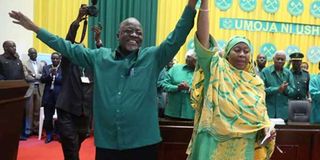Tanzania's John Magufuli tops race for presidency, poll shows

CCM presidential candidate John Pombe Magufuli and his running mate, Samia Suluhu Hassan thank delegates after their nomination in July. FILE PHOTO | NATION MEDIA GROUP
What you need to know:
- The poll is the first major study since the campaigns for the general election began a month ago.
- CCM is still the most popular party in the country with a support of 62 per cent.
- It is followed by Chadema at 25 per cent while the other parties score below two per cent.
DAR ES SALAAM.
A new opinion poll has put Tanzania ruling party’s presidential candidate Dr John Magufuli in the lead over the opposition coalition’s candidate, Mr Edward Lowassa.
The poll results released on Tuesday gave Dr Magufuli a huge lead of 65 per cent over Mr Lowassa’s 25 per cent, should the elections be held today.
Mr Lowassa is a former prime minister who defected from CCM to the opposition to run for the presidency under a Chadema ticket. He is the main rival of Dr Magufuli, the minister of works, for the top job.
The poll is the first major study since the campaigns for the general election began a month ago.
It shows that other than the leading two candidates, eight candidates in fringe parties share 3 per cent while 7 per cent of the voters remain undecided.
According to Mr Aidan Eyadkuze, the executive director of Twaweza that carried out the opinion polling, CCM is still the most popular party in the country with a support of 62 per cent.
It is followed by Chadema at 25 per cent while the other parties score below two per cent.
The study revealed there was public misinformation on the actual status of the opposition coalition popularly known as Ukawa, with 49 of those polled thinking that Ukawa is a registered political party, which it is not.
Even more, 57 per cent think that the name ‘Ukawa’ will appear on their ballot papers.
The study results were released by Twaweza in a research brief titled “Let the people speak: Citizens’ views on political leadership.’ The brief is based on data from Sauti za Wananchi, a high-frequency mobile phone survey.
The findings are based on the first call round conducted in late August and early September 2015, with 1,848 respondents.




